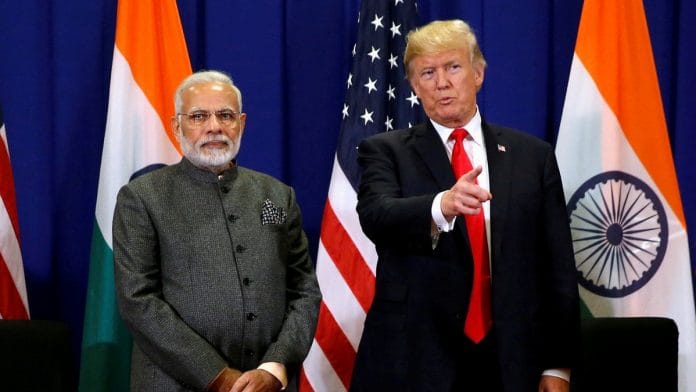Taking forward from what I wrote Monday, China poses different challenges to India and the US. But equally importantly, the US and India are also different in their capacity to meet this challenge. This difference must be kept in mind as New Delhi and Washington plan the way forward in their strategic partnership. The two sides also need to keep the focus on the central reason for their partnership, which is to counter China’s power, rather than be diverted by secondary issues.
There is clearly some growing recognition, especially on India’s side, of the importance of the partnership. Although its speed can be faulted, New Delhi has moved steadily to deepen the relationship with the US, embracing the Indo-Pacific concept and strengthening the Quad dialogue. It worries less now every time Beijing coughs. This makes it all the more important that India be realistic about how the relative power between itself and the US impacts their relationship.
America’s vastly greater power as compared to India (or even other Indo-Pacific countries) afford it greater choices. Simply put, the US is a global power whose reach and effectiveness China will not be able to match for at least another decade. China can, at best, challenge US power in the Asian littoral but it is still a long way from being able to challenge even the US’ global dominance, let alone be a direct threat to the US mainland.
The consequence is that, if it wants to, American power allows it to counter China all by itself. The world’s largest economy does not need allies. For Washington, partnerships and alliances with like-minded Indo-Pacific countries are useful because it helps to reduce the cost of competing with Beijing. Sharing the burden of a common endeavour is just more efficient.
Also read: India can’t continue to overlook Trump’s diplomatic slights. Time to redefine ties sensibly
The choice is stark
But US President Donald Trump has questioned this logic, asserting that allies are more of a burden. And as a recent debate in the Foreign Affairs magazine – tellingly titled “Come Home, America?” – illustrate, this view is not confined to Trump, but is also spreading among the American popular opinion and the elites. Americans increasingly think that the costs of such partnerships are not worth the benefits. They are wrong , of course, but the point to note is that Washington can unburden itself of these partnerships and go it alone because the US is still far stronger than China. It at least has that option, even if that option is unnecessarily expensive and foolish.
Indo-Pacific powers, including India, do not have that choice. They need the US more than the US needs them. Even assuming that Indo-Pacific powers can come together without the US bringing them together, the combined strength of the Asian powers is no match for China. If they decide to stand alone, they stand even less of a chance. Beijing has become adept at the tactics of dividing partners, even when these are well-established ones, such as the European Union or ASEAN . This says a lot about the nature of China’s power.
China’s enormous wealth means its power is not just crude military capability but also encompasses political and diplomatic influences that are even more difficult to counter. As a result, India has already repeatedly been on the receiving end of China’s power on issues like the pending Nuclear Suppliers Group membership or up till April 2019, the long-drawn-out Masood Azhar case. The choice for India and the other Indo-Pacific countries is stark: either learn to live with China’s military and political hegemony in the region or partner with the US.
Also read: Trump visiting India when Chinese economy is down. Modi govt must seize trade opportunities
Coalition-building: never an easy task
An additional problem, one that afflicts both New Delhi and Washington, is that they periodically let other extraneous issues affect their partnership. The US, for example, puts stress on the relationship with issues such as trade. Indeed, some kind of trade deal is reportedly in the works for the Trump visit because of the US president’s obsession with this issue. Although trade is an important component of the relationship, strategic ties are not solely based on trade. China and the US had negligible trade relations, but they were still able to partner together to counter the Soviet Union in the 1970s and 1980s. Similarly, India and Russia built an enduring partnership based on common security concerns, though they traded little.
Likewise, India often lets Pakistan become an issue in its ties with the US. This is unfortunate because the primary reason for the relationship is to deal with the threat from China, not Pakistan.
India is much larger and far stronger than Pakistan by any measure of power. India’s economy is more than seven times as large as Pakistan’s. With the exception of nuclear weapons, India’s military is also far more capable. India does not need the US to help it take care of the threat from Pakistan. The problem is that focusing on these secondary issues will introduce unnecessary tensions that will affect the more vital part of the India-US relationship.
Also read: Who’s better for India: Donald Trump or a Democrat leader?
It is worth remembering that it was the Sixth Coalition of European powers that defeated Napoleon. Five previous coalitions failed because one or the other member of the coalition pursued narrower goals even as Napoleon picked them off one by one. The lesson is that coalition-building is never easy even when the threat is clear. India and the US need to learn to focus on the fundamental purpose of their strategic partnership instead of letting extraneous issues divert their attention.
The author is a professor in International Politics at Jawaharlal Nehru University, New Delhi. Views are personal.







US was never trusted friend.
US is very trustworthy
US is not our ally.
US is our ally